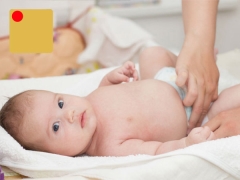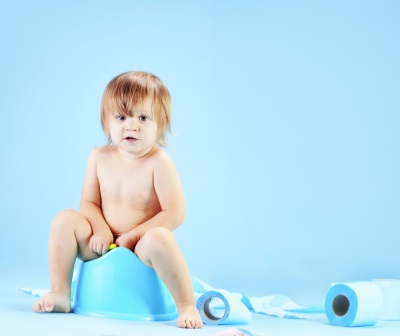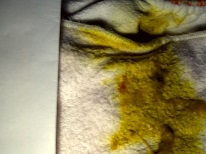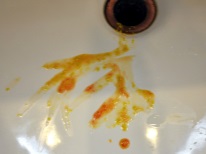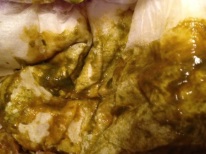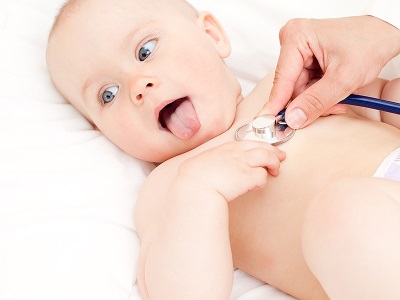What to do with diarrhea with blood in a child?
Suddenly started or constantly recurring diarrhea in a child can alarm any parent, especially if adults notice blood in the stool. Why can blood get into the feces of a child and what is important for parents to do in this case?
How does it look
The child repeatedly excretes during the day, and the stool is fluid and contains blood impurities. Often such diarrhea is accompanied by other symptoms - weakness, pain in the abdomen, fever, vomiting, and false urge to empty. In addition to blood in the stool, mucus can also be detected.
If the cause of bloody diarrhea has become dysentery, the feces resemble lumps of mucus, in which there are bloody streaks.
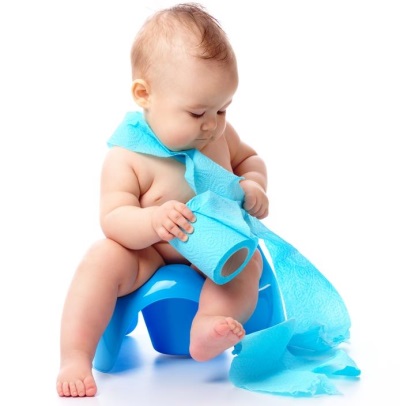
Possible reasons
Usually, blood is detected in the baby’s stool when the large intestine is affected.
A liquefied stool mixed with blood may appear in a child as a result of:
- Infections caused by bacterial or viral damage. Most often, diarrhea with blood in children provokes intestinal sticks that enter the children's body through unwashed hands and food.
- Irritation of the intestine, characteristic of serious diseases. In this case, diarrhea in which blood is detected is a long-lasting phenomenon that has disturbed the child for several weeks.
- Drug use.
- Prolonged inflammatory process. Acute diarrhea with blood impurities is characteristic of ulcerative colitis, necrotizing colitis, Crohn's disease and pseudomembranous colitis.
- Allergic reaction.
- Surgical pathology, for example, invagination of the intestine.
- Cracks of the anus or hemorrhoids.
Do not confuse the presence of blood in feces with the red color of the stool, caused by the use of products with red natural (tomatoes, beets) or artificial (desserts) dyes.
Additional symptoms
With temperature
An increase in body temperature in diarrhea is often characteristic of intestinal infections, the cause of which can be bacteria, fungi, viruses, or helminths. Also, the fever associated with diarrhea with blood may indicate an acute surgical problem.
With fever and vomiting
If a child begins to vomit, then the temperature rises and diarrhea with blood joins these symptoms, most likely the cause of this condition is rotavirus infection or food poisoning.
Since each of these symptoms causes large losses of fluid and minerals, it is important for the child to begin treatment as soon as possible (to restore electrolyte and water reserves), at the same time calling the doctor.
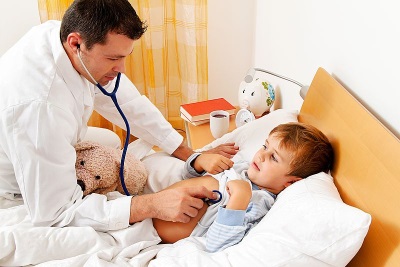
In infants
The presence of blood in a liquefied baby stool is a manifestation of the defeat of its intestines by bacteria, viruses, worms or other factors. A child may cry for abdominal pain. He may have a fever and vomiting.
Such symptoms should be cause for concern to any mother.
It is important to call the baby’s doctor as soon as possible and not to treat the baby yourself, as diarrhea in an infant younger than one year old is especially dangerous with rapidly developing dehydration.
If diarrhea in crumbs green, read the article about green breastfeeding stools and artificial feeding green stool.
In older children
The feces with blood can be slim, with impurities of mucus. The child often complains of false urge to the toilet, as well as pain in the abdomen. A common cause of the presence of blood in the feces of large children is hemorrhoids or anal fissure. The blood in this case is bright red, and the feces can be hard.
What to do and when to run to the doctor?
The best way to detect blood in a liquefied stool of a child is to consult a doctor. Treatment of bloody diarrhea in the first place will be influenced by its cause, therefore, it is impossible to treat this condition on its own.
The presence of blood in the child’s feces should immediately alert the parents and cause a pediatrician to call.
The blood in the feces itself is the reason for seeking medical attention.
Also, it is not necessary to hesitate to call an ambulance if:
- you see in your child the symptoms of dehydration,
- the child complains of severe abdominal pain,
- child is reeling and tearing.
Urgent Care
Prior to the arrival of a pediatrician, parents should take care of rehydration, that is, ensure that the child has enough drink, which contains not only water, but also minerals that he loses during diarrhea. This will help pharmaceutical drugs, a few bags which must necessarily enter into the home first aid kit.
If a child has a fever, you can give him a febrifuge in the age dosage. It is not recommended to give other medicines before the baby examines the doctor.
